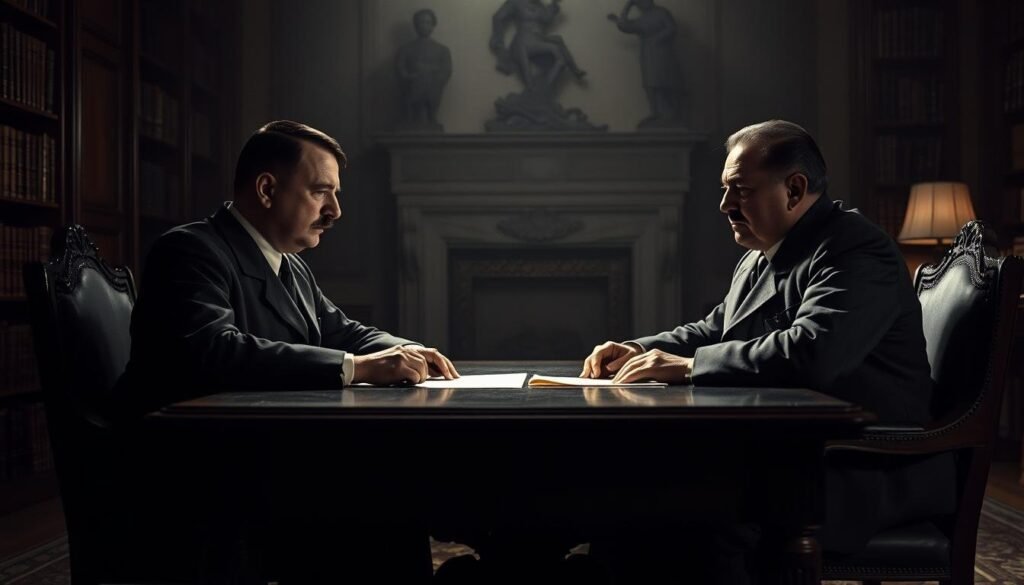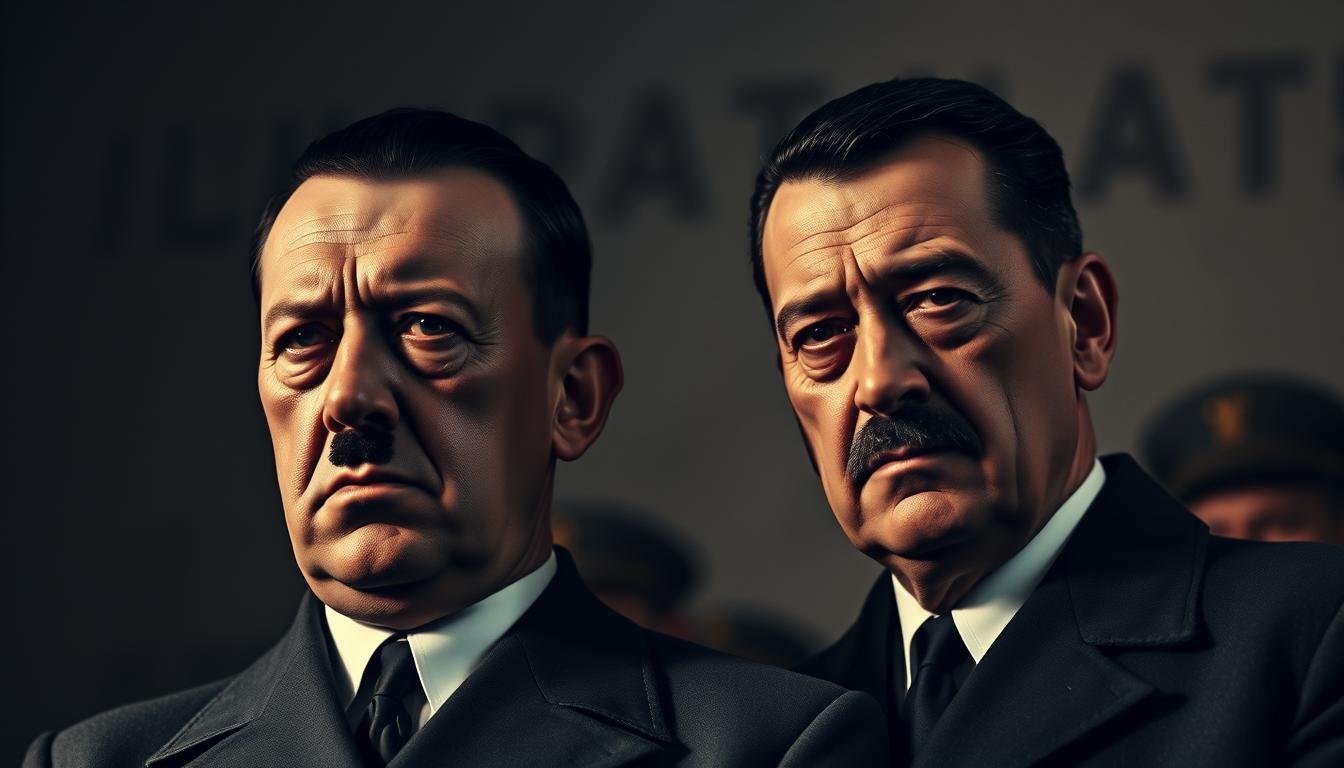What Did Hitler Think of Mussolini? Ever wondered about the bond between two of the 20th century’s most powerful fascist leaders? The connection between Hitler and Mussolini was key to World War II. It greatly influenced European history.
Their partnership, known as the Nazi Fascist alliance, was based on shared goals and beliefs. As you delve into this, you’ll see how their collaboration affected the world.
Their relationship was more than just an alliance. It was a mix of power, beliefs, and strategic plans. Knowing about their bond helps us understand World War II better.
Contents
- 1 The Early Impressions
- 2 Ideological Similarities and Differences
- 3 What Did Hitler Think of Mussolini?
- 4 Key Meetings and Their Impact
- 5 Hitler’s Assessment of Italian Military Capabilities
- 6 The Rescue of Mussolini and Final Relationship
- 7 Aftermath
- 8 Understanding the Hitler and Mussolini Legacy
- 9 FAQ: What Did Hitler Think of Mussolini?
- 9.1 What was the nature of the alliance between Hitler and Mussolini?
- 9.2 How did Hitler perceive Mussolini’s fascist ideology?
- 9.3 How did Hitler assess Italian military capabilities during World War II?
- 9.4 What was the significance of the rescue of Mussolini by German forces?
- 9.5 How did the relationship between Hitler and Mussolini evolve over time?
The Early Impressions
Mussolini’s rise in Italy caught Hitler’s eye, shaping his views. Hitler was drawn to Mussolini’s power and fascist ideology. He saw how Mussolini’s methods could work for Germany.
Hitler admired Mussolini’s ability to unite Italy. He noted Mussolini’s leadership, propaganda, and control over opposition. These factors influenced Hitler’s own plans.
- Mussolini’s charismatic leadership style
- The effectiveness of fascist propaganda
- The suppression of opposition through authoritarian means
Ideological Similarities and Differences
The Nazi party and Fascist regime, led by Hitler and Mussolini, had a complex relationship. They shared some ideas but also had big differences. Their alliance was shaped by both similar and different beliefs.
Key Similarities
- Nationalism: Both leaders believed in the greatness of their nations.
- Authoritarianism: Hitler and Mussolini ruled with strict control, silencing critics.
- Anti-Communism: They both saw communism as a major threat, strengthening their bond.
Yet, they had big differences too. Hitler’s Nazi party focused on racial purity and hated Jews. Mussolini’s Fascism, on the other hand, was more about Italian pride and growing its empire.
These differences sometimes caused trouble between them, affecting their work together.
Looking at these similarities and differences helps us understand the complex relationship between Hitler and Mussolini. It also shows how their beliefs influenced World War II.
What Did Hitler Think of Mussolini?
Hitler saw Mussolini in many ways. At first, he admired Mussolini for making Italy stable through fascism. Hitler believed Mussolini’s regime was similar to his own vision for Germany.
Hitler’s view of Mussolini went beyond just ideology. Their meetings and correspondence showed a complex relationship. Hitler wanted to show his strength by being friends with Mussolini.
The table below shows what Hitler thought of Mussolini. It highlights both the good and bad parts of their relationship.
| Aspect | Hitler’s View | Impact on Their Relationship |
|---|---|---|
| Ideological Alignment | Hitler admired Mussolini’s fascist ideology, seeing it as a model for his own political ambitions. | Strengthened their initial alliance, as both leaders shared common goals. |
| Leadership Style | Hitler was initially impressed by Mussolini’s leadership, but later became critical as Mussolini’s power waned. | Created tension as Hitler began to see Mussolini as weak, affecting their personal rapport. |
| Strategic Alliance | Hitler valued the strategic benefits of their alliance, using it to further his own military and political objectives. | Deepened their cooperation, especially during the early years of their regimes. |
In conclusion, Hitler’s thoughts on Mussolini were complex. He admired Mussolini’s ideology and saw the value in their alliance. As their relationship changed, so did Hitler’s view of Mussolini.
Key Meetings and Their Impact
Did you know how meetings between Hitler and Mussolini shaped their bond? These meetings were more than just formal chats. They were key moments that changed the course of World War II. The two leaders met several times, each meeting having its own special impact on their alliance.
The first meeting between Hitler and Mussolini happened in 1934. It wasn’t a hit at first because of language and cultural barriers. But it set the stage for their future meetings. Later, their meetings became stronger, mainly because of their shared dislike for communism and strategic goals.

| Meeting Year | Location | Key Outcomes |
|---|---|---|
| 1934 | Venice, Italy | Initial meeting, laid groundwork for future interactions |
| 1936 | Berlin, Germany | Strengthened alliance, mutual defense pact |
| 1940 | Br Brenner Pass | Discussion on military strategies, Axis powers coordination |
These meetings were vital in shaping the Axis powers’ strategy in World War II. The personal connection between Hitler and Mussolini was key in their decisions. Understanding these meetings gives us a deeper look into their alliance and the world’s politics back then.
The effects of these meetings went beyond Germany and Italy. They had big impacts on Europe and the world. As we look back at World War II, the importance of Hitler and Mussolini’s meetings becomes clear.
Hitler’s Assessment of Italian Military Capabilities
Hitler’s view on Italian military strength was crucial during World War II. He was worried about Italy’s military performance. This concern affected his alliance with Italy and his strategic plans.
Hitler was first impressed by Mussolini’s rise and Italy’s Fascist regime. But, as the war went on, Italy’s military weaknesses became clear. Their early battles in North Africa and the Balkans showed big problems.
Hitler was concerned about Italy’s lack of modern equipment and inadequate training. Their military tactics were old-fashioned. Their logistics and supply chain were also weak. These issues made their military less effective and strained German resources.
Despite these problems, Hitler stayed loyal to Italy. He valued his relationship with Mussolini and wanted a strong front against the Allies. But, he was cautious, letting Germany carry the load in key battles.
In summary, Hitler’s opinion on Italy’s military was mixed. He saw both their successes and failures. His decisions were based on a detailed understanding of their strengths and weaknesses.
The Rescue of Mussolini and Final Relationship
The rescue of Mussolini by German forces was a key moment in the end of Hitler and Mussolini’s bond. In September 1943, after Mussolini was arrested by the Allies in Italy, Hitler sent a bold rescue team. They successfully got Mussolini out of his captors, showing Hitler’s strong support for their partnership.
After being rescued, Mussolini was put back in charge of a puppet government in northern Italy. But his power was greatly reduced, and he needed German help a lot. Hitler still saw Mussolini as a vital ally, even when things looked bad for them.
The last years of their friendship were filled with both loyalty and practical thinking. Hitler kept supporting Mussolini, even as the war went against them. This support was clear in the military help given to Mussolini’s government.
Aftermath
The rescue of Mussolini and the worsening situation for the Axis powers made their relationship tense. As the Allies moved forward, it became clear how bad things were. Mussolini’s capture and death by Italian partisans in April 1945 ended their alliance sadly.
In the end, Hitler still saw Mussolini as loyal and respected, even when they were losing. The rescue of Mussolini and what followed showed the complex mix of shared beliefs and practical needs in their alliance until the end.
Understanding the Hitler and Mussolini Legacy
You’ve learned about the complex relationship between Hitler and Mussolini, two infamous leaders. Their alliance, though rocky, greatly influenced World War II.
Reflecting on their legacy shows their bond was a mix of similarities and differences. Hitler initially admired Mussolini but their relationship changed over time. This was due to key meetings and assessments of Italy’s military strength.
The rescue of Mussolini by Germans in 1943 was a turning point. It showed Hitler’s strong commitment to Mussolini. Thinking about their story’s end, you gain insight into their complex relationship.
The legacy of Hitler and Mussolini reminds us of the complexities of historical alliances. Their actions still impact the world today.
See Also: What Would Happen if Hitler Won World War II?
FAQ: What Did Hitler Think of Mussolini?
What was the nature of the alliance between Hitler and Mussolini?
Hitler and Mussolini formed an alliance in the mid-1930s. This alliance, known as the Axis powers, was complex. It showed both cooperation and tension between the two fascist leaders.
How did Hitler perceive Mussolini’s fascist ideology?
Hitler was initially impressed by Mussolini’s fascist ideology. He saw it as a model for his own Nazi party. He admired Mussolini’s power consolidation and authoritarian style.
How did Hitler assess Italian military capabilities during World War II?
Hitler had mixed views on Italian military capabilities. He initially overestimated their strength. Later, he became critical of their poor equipment and leadership.
What was the significance of the rescue of Mussolini by German forces?
The rescue of Mussolini in 1943 was a key event. It showed Hitler’s commitment to his ally. It also highlighted his willingness to risk support, even when things were going badly.
How did the relationship between Hitler and Mussolini evolve over time?
The relationship between Hitler and Mussolini started with mutual admiration. Over time, it became strained. As the war went against the Axis, their alliance weakened and eventually ended with their defeat.

Jayceon Schaefer, a social worker from Wailuku, Hawaii, is passionate about history. He created HitlerStory.com to share his deep interest in Adolf Hitler and explore complex historical topics through writing.

